How to Keep Squirrels Out of Garden Tips: Friendly Advice for Gardeners
Having a garden is a rewarding way to connect with nature and grow your own food and flowers. Yet, one of the common challenges gardeners face is pesky squirrels. These little critters can dig up bulbs, munch on fruits and vegetables, and generally wreak havoc.
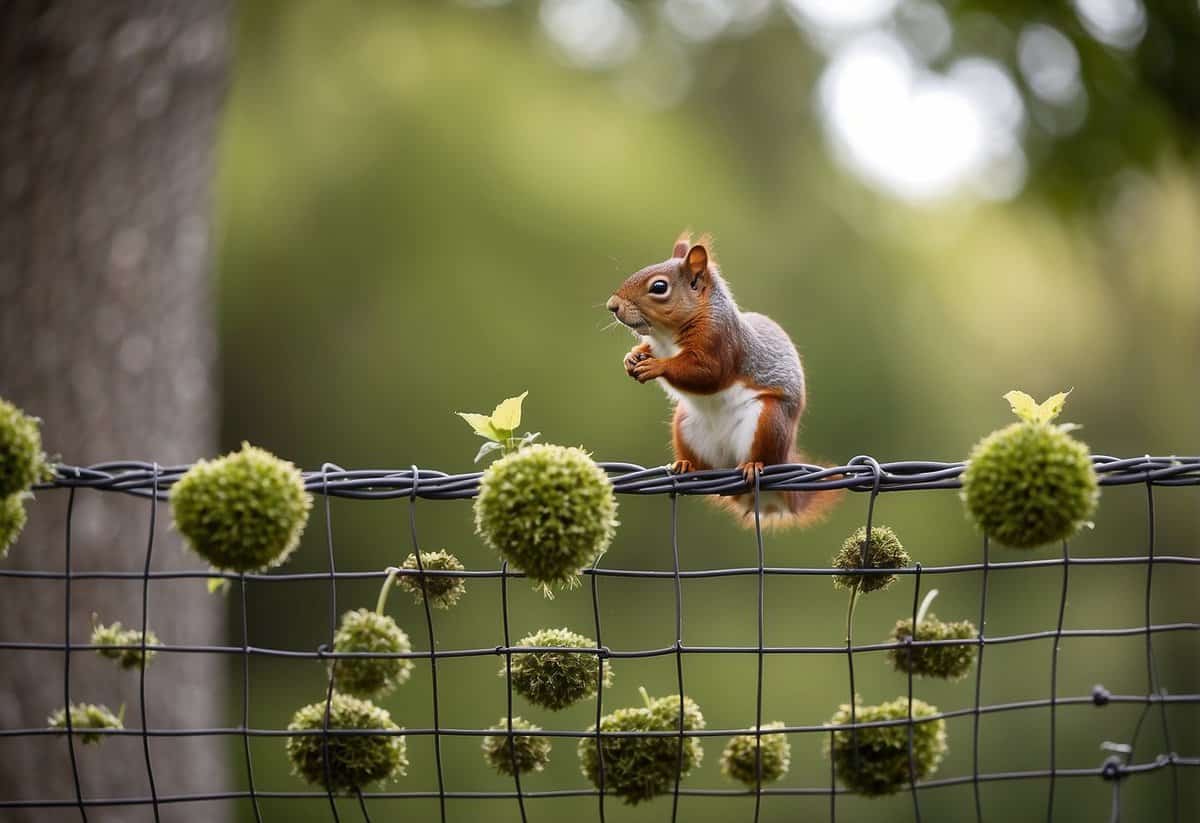
Keeping squirrels out of your garden can save you a lot of frustration and protect your plants. Learning a few effective methods can make your gardening experience more enjoyable. With some simple strategies, you can deter squirrels without harming them or the environment.
1) Install a Squirrel-Resistant Feeder

A squirrel-resistant feeder can be a game changer for your garden. These feeders are designed with mechanisms that prevent squirrels from getting to the birdseed while allowing birds to feed peacefully.
Look for feeders with weighted perches. These close access to food when a squirrel’s weight is detected. Another option is a wrap-around baffle, which creates a barrier that squirrels can’t climb over.
Different styles are available, such as tube feeders with cages around them. This keeps the seed safe while letting birds get what they need.
2) Use Squirrel-Proof Netting
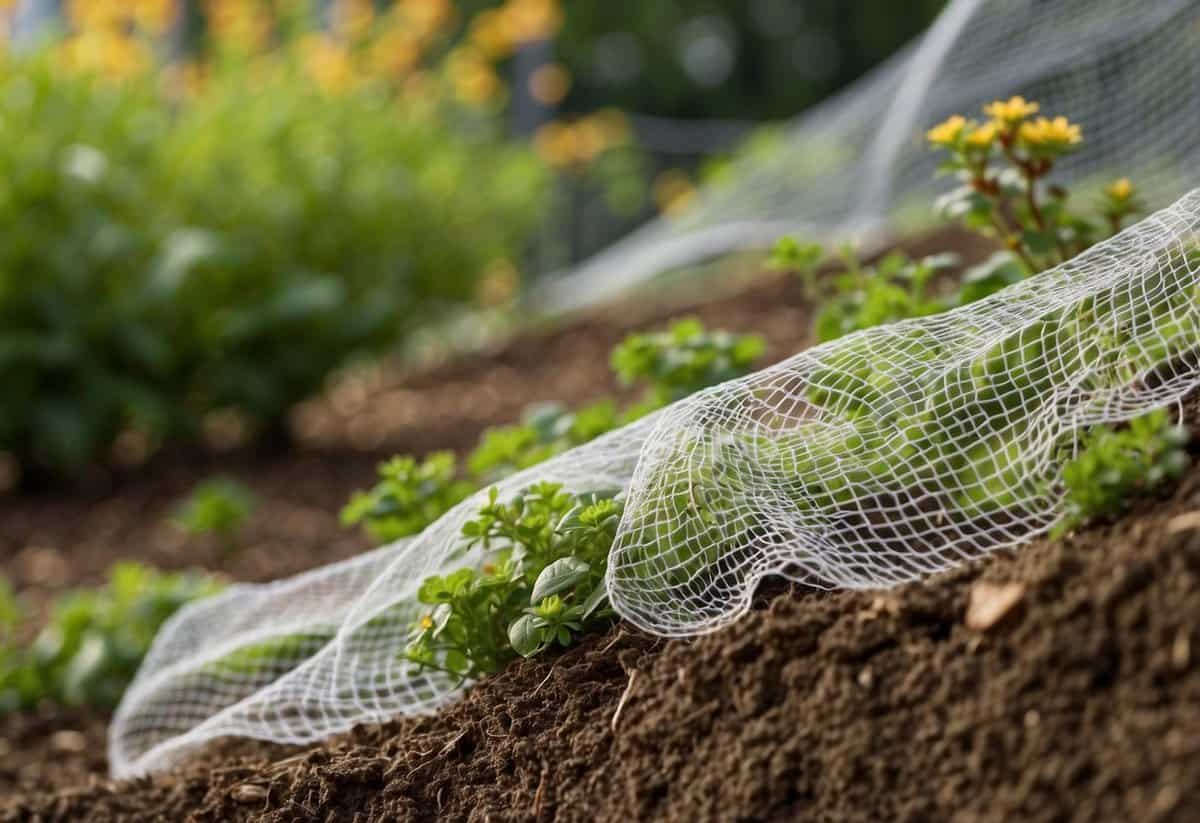
Squirrel-proof netting is a great way to protect your garden. You can place the netting over plants and flowers to stop squirrels from digging and stealing food.
Make sure the netting covers the plants completely. Secure the edges to the ground to prevent squirrels from getting underneath. This will help keep your garden safe.
Consider using metal or plastic mesh for added durability. This type of netting can last longer and provide better protection against persistent squirrels.
3) Plant Squirrel-Repellent Flowers
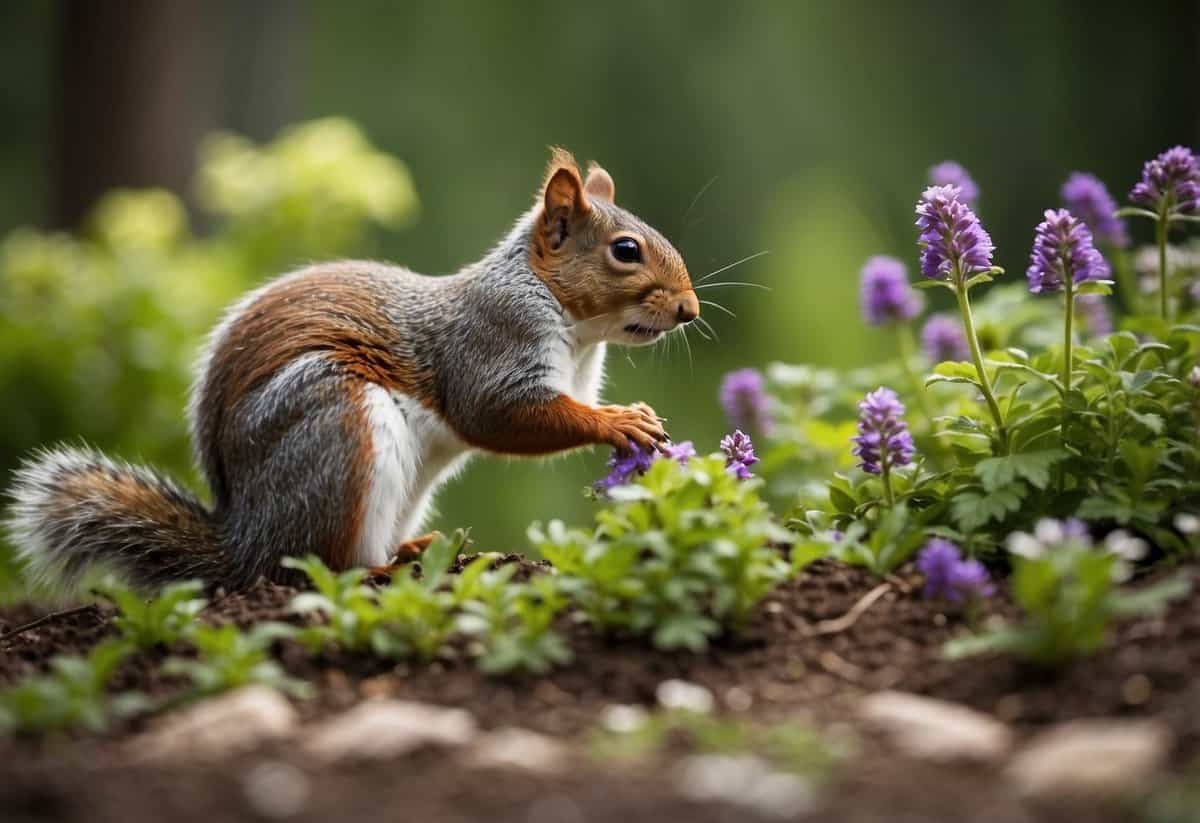
You can keep squirrels away by planting flowers they dislike. Marigolds are a great choice. They have a strong smell that squirrels find unpleasant.
Daffodils are another good option. These bright flowers are toxic to squirrels, so they avoid them.
Alliums, like onions and garlic, can also help. Squirrels don’t like their scent, making them a natural repellent.
4) Spread predator urine

Using predator urine can help keep squirrels away from your garden. The scent makes squirrels think a predator is nearby, so they avoid the area.
You can buy predator urine, like coyote urine, from hunting supply stores or online. Sprinkle it around the garden’s edges for the best effect.
Reapply the urine regularly, especially after it rains, to keep the scent strong.
5) Build a Physical Barrier

Using physical barriers can be one of the most effective ways to keep squirrels out of your garden. Set up fences, netting, or cages to block their access. For best results, fences should be about 30 inches tall and smooth to prevent climbing.
Consider covering specific plants or areas with mesh or cloches. This will help protect your garden from curious squirrels looking for a snack. Placing barriers around individual plants can also be useful. This ensures that even the most determined squirrels can’t reach your precious veggies and flowers.
6) Use motion-activated sprinklers

Motion-activated sprinklers are a great way to keep squirrels out of your garden. These sprinklers have sensors that detect movement. When a squirrel comes close, the sprinkler sprays water, scaring it away.
Squirrels are easily startled, making this an effective method. Try a popular model like the Contech CRO101 Scarecrow, which you can find here.
By setting up these sprinklers in your garden, you will protect your plants and keep squirrels at bay.
7) Offer Alternative Food Sources
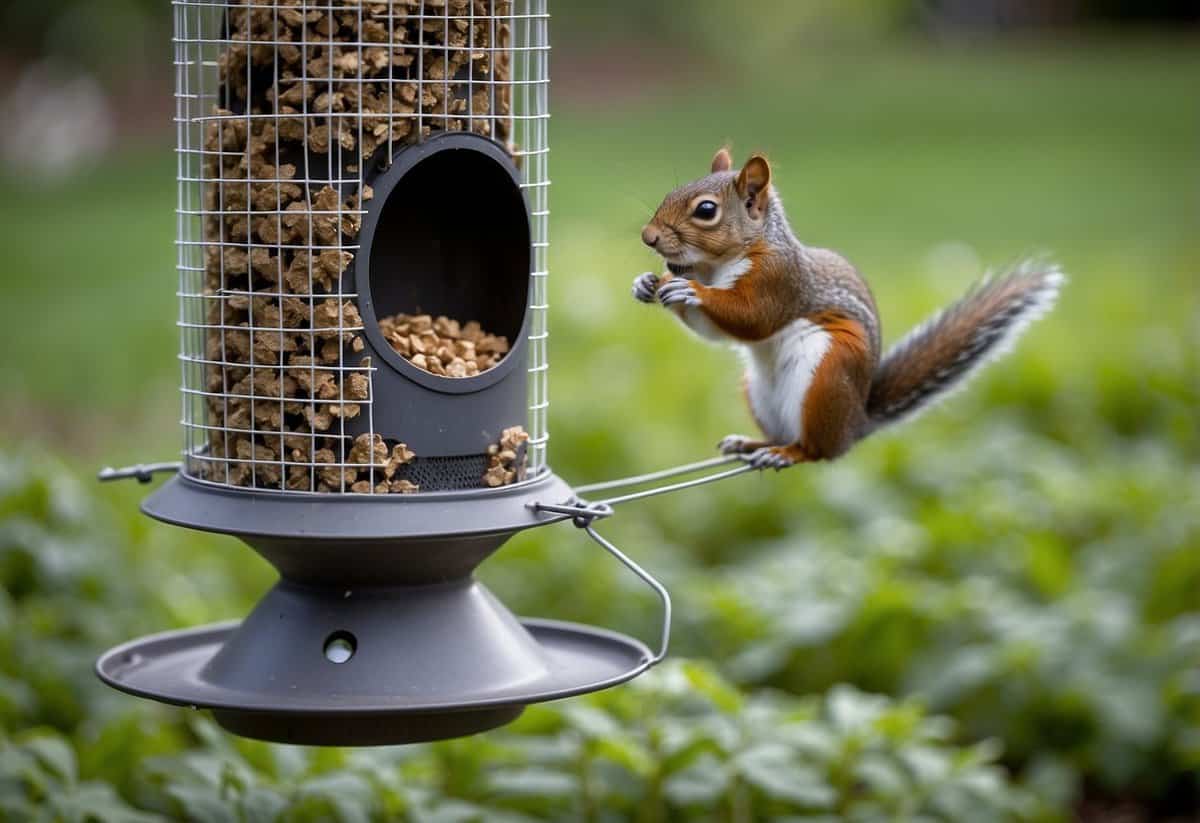
Give squirrels their own food to keep them away from your garden. Place a squirrel feeder filled with sunflower seeds, peanuts, or corn in a spot distant from your plants.
This can distract them and reduce their interest in your garden. Squirrels are less likely to raid your veggies if they have their own snacks nearby.
8) Apply Hot Pepper Spray

To keep squirrels away, make a hot pepper spray. Boil water and add cayenne pepper, paprika, and chopped jalapeño peppers. Let the mixture simmer for about 20 minutes.
After it cools, strain it into a spray bottle. Use this mix on your plants. Be careful not to spray on leaves until you know it won’t harm them. This will deter squirrels from munching on your garden. Check this recipe for detailed directions.
9) Create a Decoy Garden
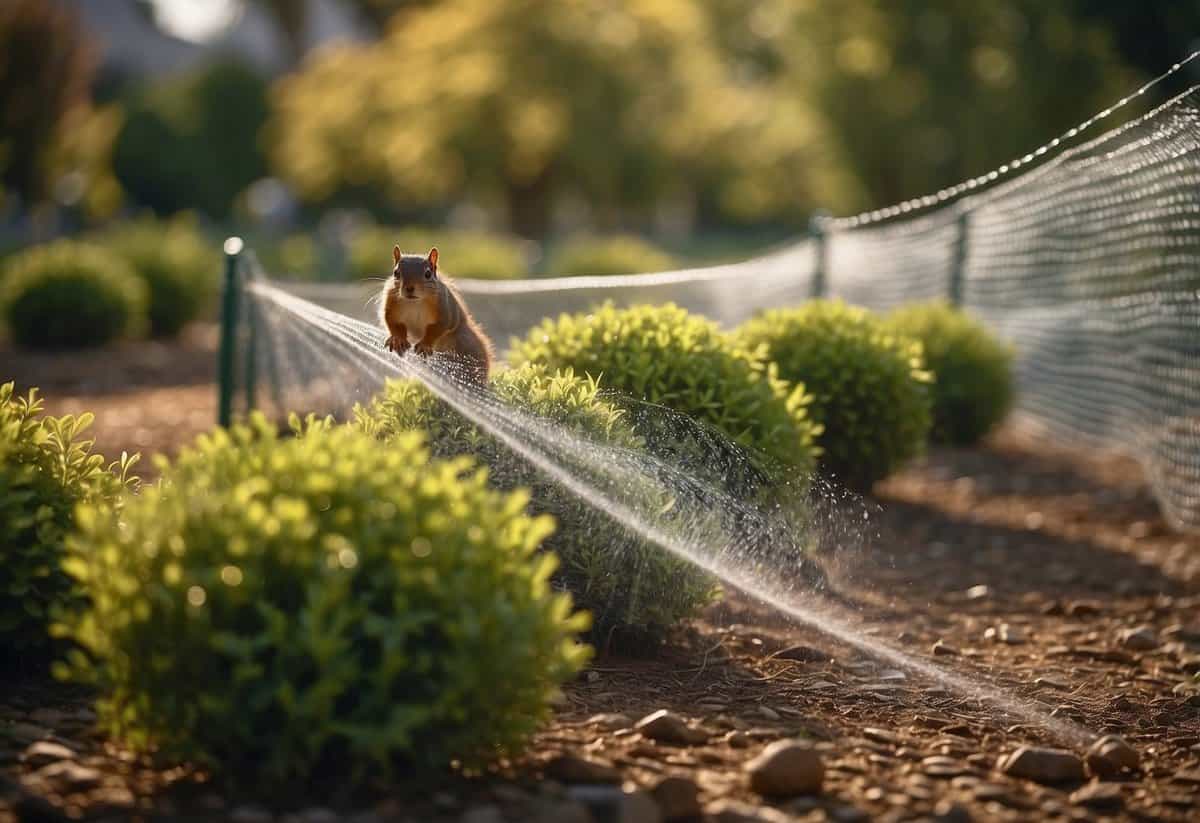
Set up a small, separate area with plants and treats that squirrels love.
Consider planting corn, sunflowers, or other favorites to lure them away.
Keep this decoy garden far from your main garden to reduce squirrel visits.
Provide easy access to water and food to keep them occupied.
A decoy garden can help protect your main plants without harming the squirrels.
10) Use Reflective Objects

Hanging reflective objects around your garden can help scare away squirrels. Items like CDs, aluminum foil strips, and shiny pinwheels work well.
The movement and shine of these objects create an environment that squirrels find unsettling. They will likely avoid the area.
Change the location of these reflective objects often. This keeps the squirrels from getting used to them. You can find more tips here.
Understanding Squirrel Behavior

Knowing why squirrels come into gardens helps you find ways to keep them out. Understanding their habits will help you protect your plants more effectively.
Why Squirrels Invade Gardens
Squirrels are always looking for food. Gardens often have fruits, vegetables, and seeds that squirrels love to eat. They might also dig holes to bury their food for later. If you have bird feeders, they can also attract squirrels, who are clever at getting to the seeds.
Another reason squirrels come to gardens is for shelter. They use gardens with tall trees, bushes, and small holes in the ground to build their nests. If your garden offers these features, it can be very inviting to them.
Common Squirrel Habits
Squirrels are quite active during the day, especially in the early morning and late afternoon. They are skilled climbers and jumpers. These skills help them get food and escape from other animals.
They like to dig. You may see small holes in your garden where squirrels have buried nuts. Squirrels also chew on things to keep their teeth sharp. This means they might nibble on garden furniture, plants, or even the bark of trees.
Squirrels communicate with sounds and tail movements. They use these signals to alert other squirrels about danger or food sources. Understanding these habits can help you better handle their presence in your garden.
By learning what drives squirrels and how they behave, you can create strategies to keep them out. For more tips, check out humane methods to keep squirrels out of your garden at Masterclass and effective methods at Bob Vila.
Effective Barriers

Using barriers can be the most reliable way to keep squirrels out of your garden. Two of the most popular methods are fencing solutions and netting or covers, both of which physically block squirrels from accessing plants and soil.
Fencing Solutions
Fencing is a strong barrier that physically keeps squirrels away from your garden. Choose a fence material that squirrels cannot easily chew through, like metal mesh. The height of the fence is also essential; it needs to be at least 4 feet tall and extend a couple of inches underground to deter digging.
Tips for Installing Fences:
- Use metal mesh or galvanized wire.
- Ensure the fence stands at least 4 feet tall.
- Bury the bottom edge a few inches underground.
Consider adding an angled top to the fence. This makes it harder for squirrels to climb over. Some gardeners prefer electric fencing, but that’s more complex and not always necessary. Practical and sturdy fencing can be enough to keep your garden squirrel-free.
Netting and Covers
Netting and covers are effective in protecting individual plants or small garden sections. Durable materials like nylon or metal mesh work best. Place the netting over plants and secure it tightly to the ground to prevent squirrels from getting underneath.
Tips for Using Netting and Covers:
- Choose strong materials like nylon or metal mesh.
- Cover only the areas that need protection.
- Secure the edges to the ground using stakes or weights.
Another option is using floating row covers. They not only shield plants from insects and weather but also keep squirrels away. By incorporating netting and covers appropriately, your plants can enjoy a safe growing season without interference from pesky squirrels.
Natural Repellents

Using natural repellents can keep squirrels out of your garden without harming them or the environment. These methods include planting certain herbs and using scents that mimic predators.
Herbal Options
Certain plants act as natural repellents to keep squirrels at bay. Marigolds, daffodils, and hyacinths are examples of flowers that squirrels tend to avoid. The scent of these plants is unpleasant to them, making your garden less appealing.
Mint, alliums, catnip, and lily of the valley are other plants you can use. Squirrels find the strong smells of these plants off-putting. By planting these around your garden’s perimeter or interspersed with your veggies and flowers, you can create a natural barrier.
For added effect, consider using essential oils derived from these plants. Peppermint oil, for instance, can be mixed with water and sprayed around the garden. This creates an additional layer of defense with minimal effort.
Predator Scents
Squirrels are naturally wary of predators. You can take advantage of this by using scents that mimic their natural enemies. Products made to smell like urine from foxes, coyotes, or bobcats can be effective. These repellents can be purchased at garden stores and are easy to apply around your garden.
Another option is using predator hair. Hair from dogs or cats, for example, can be scattered around the garden. This method makes squirrels think there’s a predator nearby, discouraging them from venturing into the area.
Ammonia-soaked rags can also mimic the smell of predator urine. Place these rags in areas where squirrels are most active. Be sure to replace the rags regularly to maintain the scent’s effectiveness. Using these natural scents helps maintain a healthy balance in your garden while keeping it squirrel-free.
Squirrel-Proof Planting Strategies

Creating a garden that squirrels will avoid involves selecting specific plants and arranging your garden layout strategically. These methods help protect your plants from these persistent critters.
Squirrel-Resistant Plants
Certain plants are less appealing to squirrels due to their taste, scent, or texture. For example, Daffodils have a strong scent that squirrels dislike. Alliums, such as garlic and onions, are also unappetizing to them.
Fritillaries emit a smell that repels squirrels. These flowers can deter squirrels while adding beauty to your garden. Hot peppers contain capsaicin, which squirrels find too spicy. Planting them can also act as a deterrent.
Choosing these plants helps create a garden that squirrels are likely to avoid.
Strategic Garden Layout
Arranging your garden layout can further help deter squirrels. For example, using raised garden beds can make it harder for squirrels to reach your plants. Surrounding your garden with chicken wire buried a few inches underground can prevent squirrels from digging.
Placing netting or cages over individual plants or entire rows can also protect them. Using mulch or gravel around plants may discourage digging, as squirrels prefer soft soil. Additionally, planting squirrel-resistant plants around more vulnerable crops can create a natural barrier.
These strategies can help protect your plants from being disturbed or eaten by squirrels.







